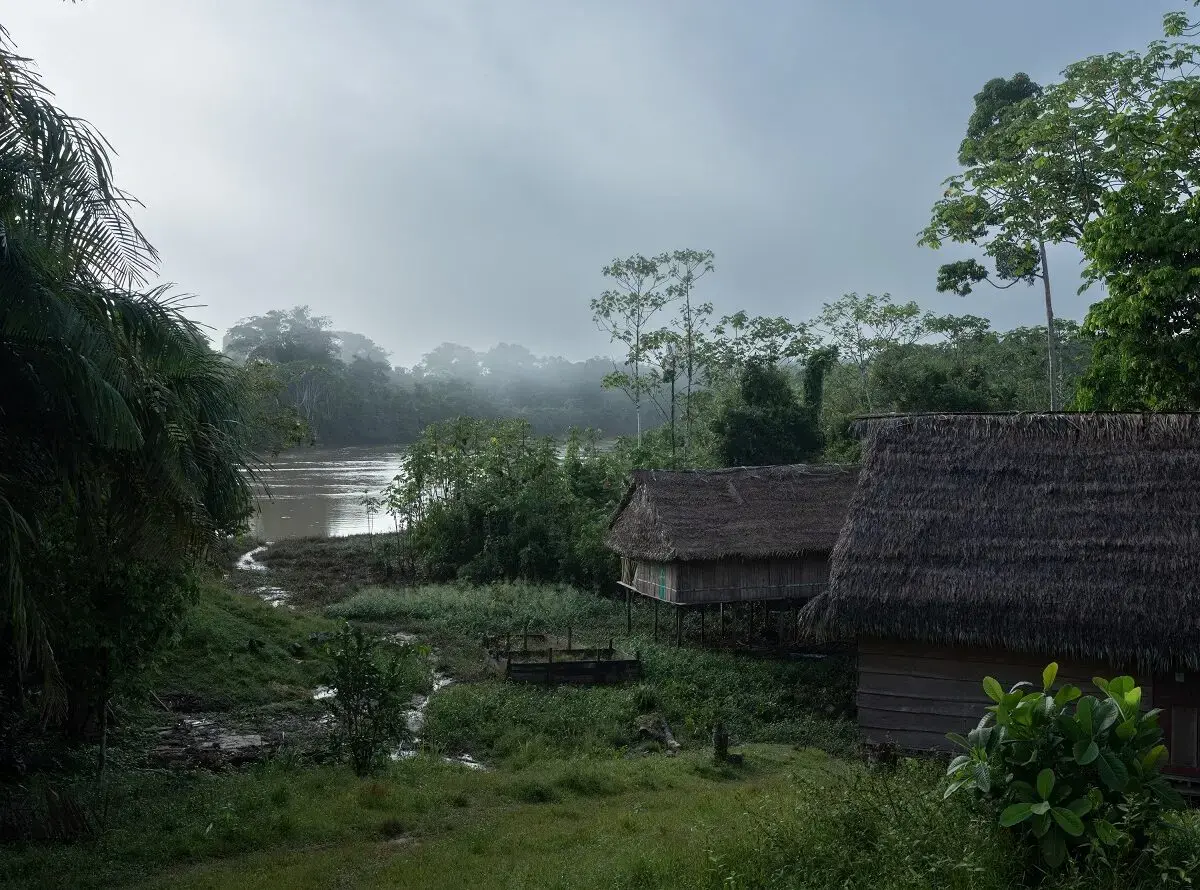
- Several companies registered in Latin American countries claiming to have U.N. endorsement have persuaded Indigenous communities to hand over the economic rights to their forests for decades to come, a Mongabay investigation has found. The companies share commercial interests across various jurisdictions, and have not been able to demonstrate experience in sustainable finance projects.
- Indigenous communities in Peru, Bolivia and Panama were promised jobs and local development projects in exchange for putting on the market more than 9.5 million hectares (23.5 million acres) of forests. According to community sources, the claims of U.N. backing were the main selling point for agreeing to put their forests on the market. All three U.N. entities cited by the companies have rejected any involvement.
- Mongabay has found that the methodology employed for valuing natural capital has not been used before; there are no public details regarding its scientific and technical basis; and the company that created the methodology refused to share information about it.
- Experts have raised concerns that a lack of regulation in the fast-growing sustainable finance industry is allowing abuses against communities that act as guardians for critical ecosystems.
IQUITOS, Peru — On the Peruvian side of the Yavarí River, overlooking the lush Brazilian shore, a weary Matsés man deletes the latest anonymous threat he received on his cellphone. He thought he and his people had seen it all: invasive logging and oil giants; the marauding cowboys of the first carbon credit rush; the quiet encroachment of illegal fishing and drug-trafficking rings into the Amazon. But then came a new disappointment.
“The hopes for jobs, stipends, study grants, were high,” he said of the scheme that promised to bring connectivity, income and opportunities to his community. He requested anonymity to avoid reprisals.
As pressure increases on governments and companies to boost climate action, sustainable finance initiatives are on the rise. But so are actors looking to profit from forest-dependent communities, well-meaning investors, and companies looking to meet environmental, social and governance (ESG) commitments.
In Peru, Bolivia and Panama, entities purportedly specialized in sustainable and climate finance have falsely claimed United Nations endorsement to talk Indigenous communities into handing over the economic rights to their forests for decades at a time, a Mongabay investigation has found. Since 2022, the companies, which share commercial interests across various jurisdictions, have presented the forest communities with promises of the life-changing benefits that commodifying their forests and respective ecosystem services can bring.
The deals targeted around 788,000 hectares (1.95 million acres) in Indigenous Kakataibo and Matsés territories in the Peruvian Amazon, 8.3 million hectares (20.5 million acres) of rainforest and dry tropical forest in Chiquitano and Guaraní land in eastern Bolivia, and 438,000 hectares (1.08 million acres) of forests inhabited by Emberá-Wounaan communities in Panama.
Fake endorsements
The key players behind the schemes are the Panama-registered Foreign Investment Company (FICO), and Fundación Luciérnaga, based in Argentina. They churn out corporate sustainability accreditations and structure sustainable finance products for their ventures with Indigenous peoples in Panama. They also provide similar services to middlemen companies Bluegrace Energy Bolivia, Peru Tecnology Green and Get Life, which have reached deals of their own with Indigenous communities in those two countries.
In theory, the sustainable finance scheme, though slightly different across countries, is a win-win for everyone, according to information shared by Get Life via an online call. If communities agree to keep trees standing, middlemen will get investors to sponsor the forest and fund local development projects. Forests will be protected, investors will get a boost to their reputation, and middlemen will get a cut from the transaction.
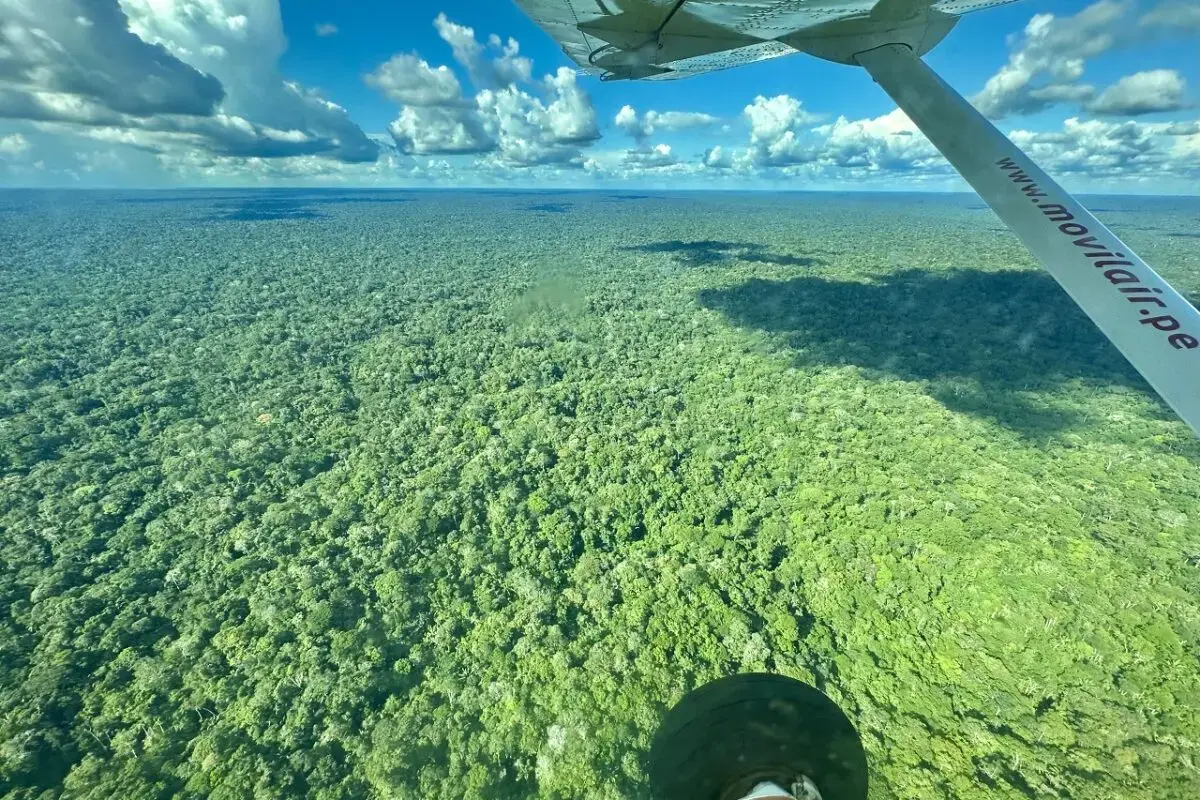
The schemes revolve around Infinite Forest Carbon (IFC), a methodology developed by FICO to price forests and their ecosystem services. Once natural capital is valued, it can be packaged into financial products and traded in capital markets. But Mongabay found no public information regarding IFC’s scientific and technical details, nor any track record of the methodology being used.
FICO describes its methodology as the best in the market for valuing natural capital, and says its qualified technical staff have expertise in U.N. Sustainable Development Goals (SDG) bonds, carbon offsetting, and payments for environmental services. FICO also lists the wife and son of its founder, Estevão Jadanhi Filho, and the president of Fundación Luciérnaga, José Kirby, as experts respectively in “ecosystemic compliance,” “IFC calculations,” and “climate finance.”
When contacted by Mongabay via email, neither Jadanhi Filho nor Kirby provided any examples of similar projects their companies had undertaken. Jadanhi Filho did not provide details regarding his staff’s expertise and declined to explain FICO’s methodology, citing competitive advantage concerns.
According to the communities and organizations consulted by Mongabay, it was the supposed involvement of the U.N. that really sold the idea to the Indigenous communities. The companies approached the communities with claims that they had U.N. endorsement or that the projects involved U.N. participation, and used U.N. logos widely across the documents and platforms seen by this investigation.
For example, FICO said its IFC was approved by the U.N. Framework Convention on Climate Change (UNFCCC) and endorsed by the U.N. Institute for Training and Research (UNITAR). The latter is the U.N.’s main training arm, coordinating a network of hubs known as CIFAL (International Training Centers for Authorities and Leaders), run with the private sector and academic institutions.
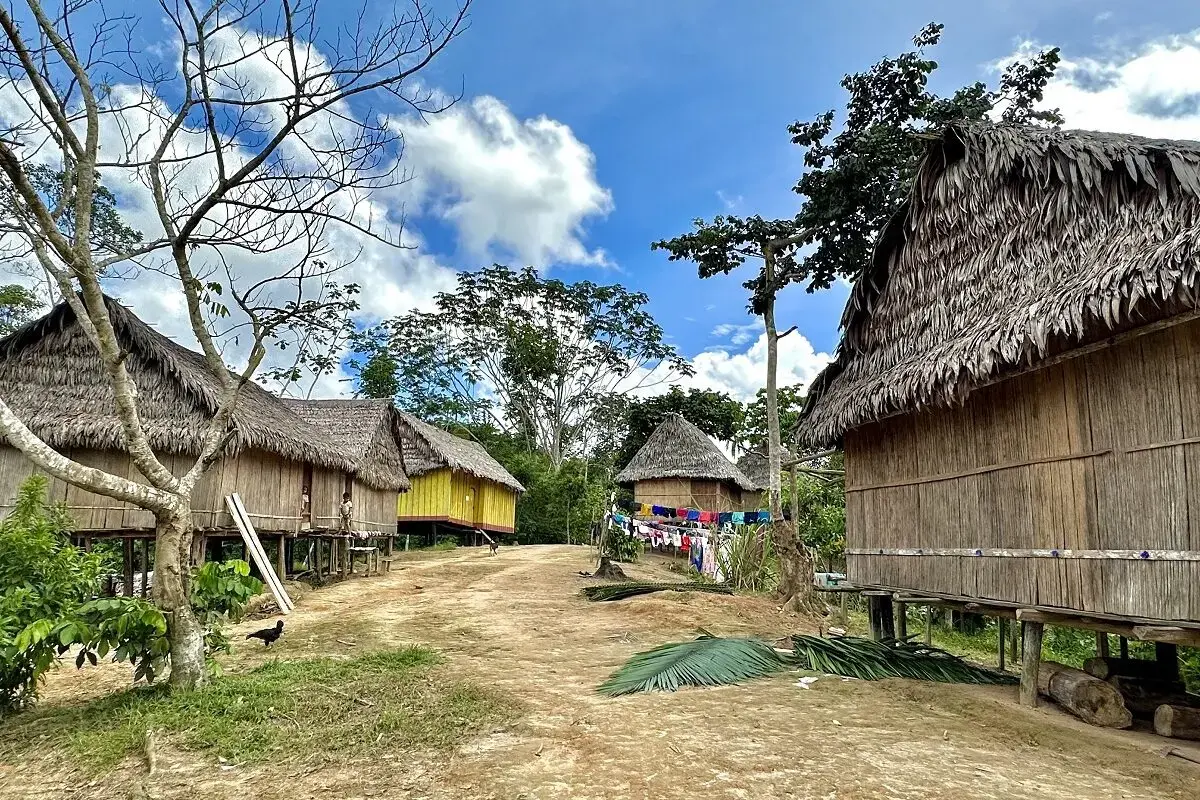
FICO’s website also said IFC had “solid financial backing” through the Panama-based Latin American Confederation of Savings and Credit Cooperatives (COLAC). But this investigation found that it was not an independent endorsement. A COLAC subsidiary had been offered to provide the fiduciary services for FICO’s scheme, while a former COLAC manager featured as an external FICO adviser linked to the U.N. Environment Programme’s Finance Initiative (UNEP-FI). The business ties between FICO and its two endorsers were not disclosed.
The U.N. entities cited told Mongabay they did not know about, or support, the IFC methodology or the financial schemes in question.
“We are not aware of those [FICO-led] initiatives, do not endorse them, and that individual [the former COLAC manager] is using UNEP-FI’s name without our permission,” UNEP-FI told Mongabay. Presented with findings of this investigation, COLAC announced the termination of its agreement with FICO and prohibited the company from using its logo. FICO’s communications about its Bolivian commercial activities still claim to have COLAC endorsement.
In Argentina, Fundación Luciérnaga had a legitimate agreement with UNITAR to run the local CIFAL Argentina center, but appears to have abused this official link to market its schemes.
In contracts with communities, corporate websites and presentations, “CIFAL Argentina/UNITAR-ONU” appears as a project auditor, SDG project certifier, and member of the committee advising Indigenous communities on how to invest profits from sustainable finance instruments and carbon dealings. The U.N. training center has also been repeatedly misrepresented as participating in the issuance of carbon credits.
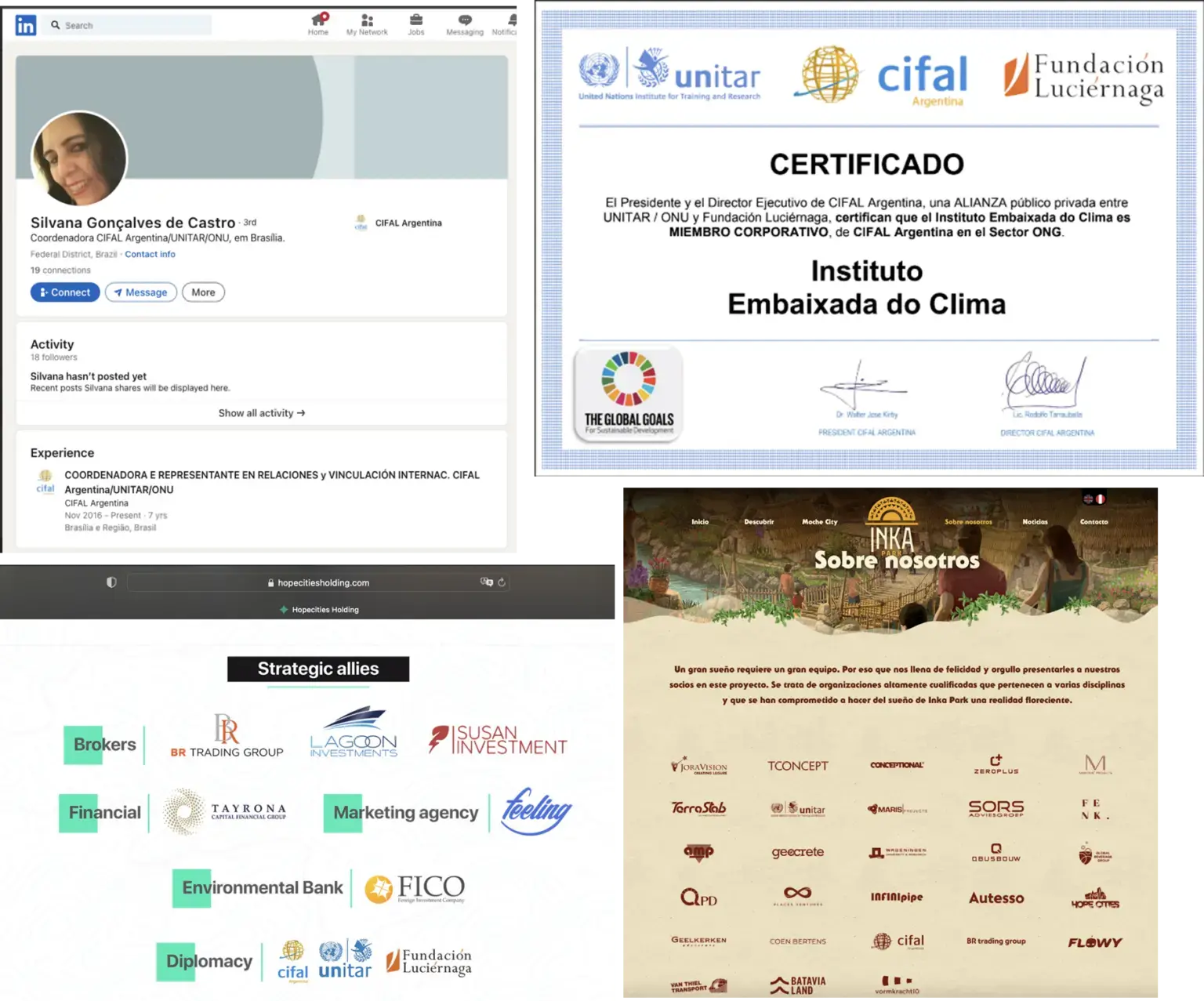
“Fundación Luciérnaga has been caught in flagrant abuse of its relationship with UNITAR and should be exposed and denounced to the public for breach of trust, commercial fraud and misuse of the ‘CIFAL Argentina’ name that was entrusted to it in good faith,” UNITAR stated in a written response to Mongabay. Presented with the findings of this investigation, UNITAR removed CIFAL Argentina from its website, saying it reserved the right to undertake legal actions in the future.
In emailed responses to Mongabay, Rodolfo Tarraubella, president of CIFAL Argentina, and José Kirby, president of Fundación Luciérnaga, attributed the unauthorized use of CIFAL and UNITAR names to third parties. They did not comment on the misuse of the UNFCCC’s name.
“I always say only valuable things get counterfeited, as happens to Rolex, foreign exchange, the UN, and ourselves,” wrote Kirby, who is also CIFAL Argentina’s honorary president.
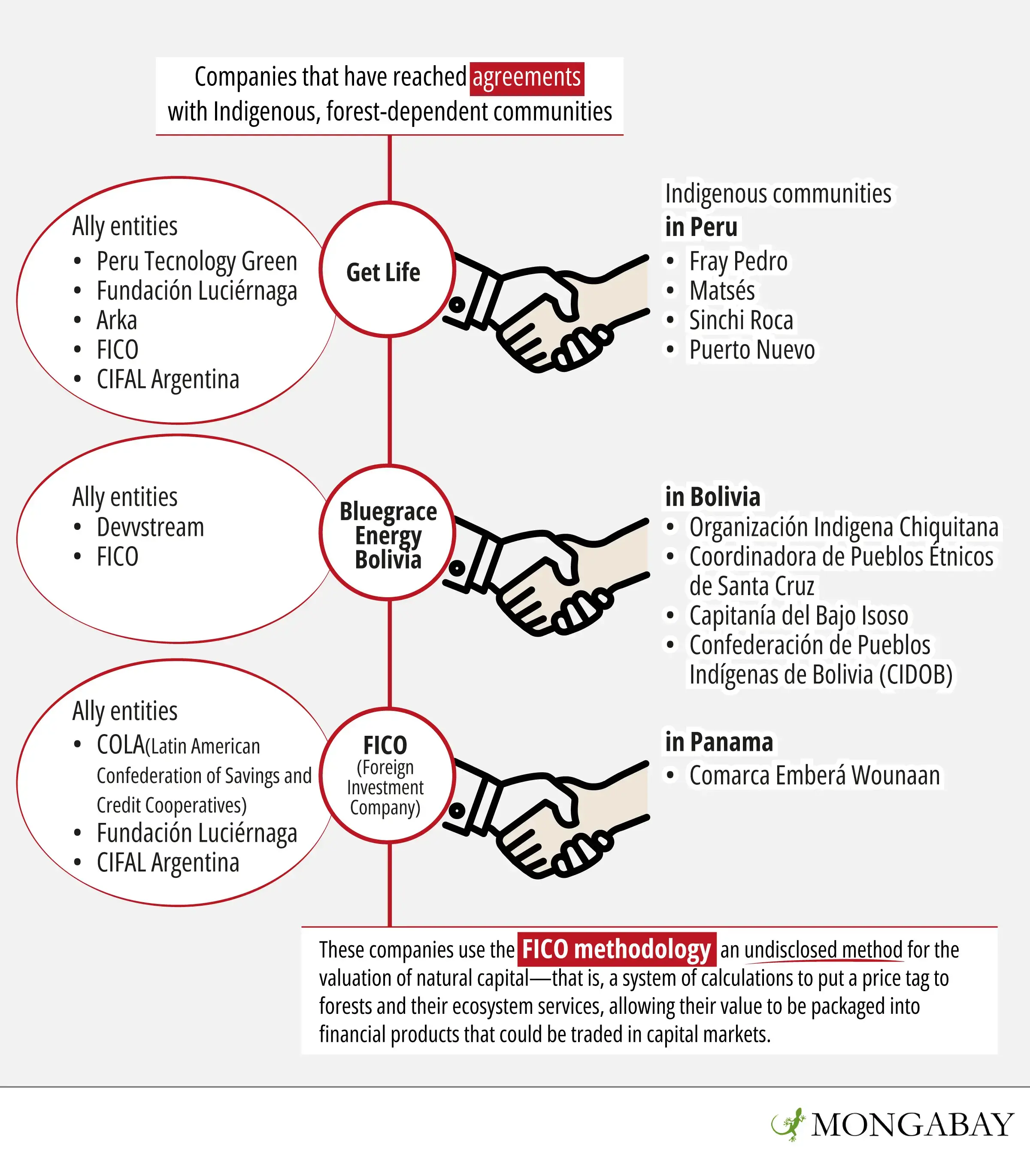
Peruvian deals
In the past two years, four Indigenous communities in Peru have handed over the economic rights to about 788,000 hectares of their forests — an area roughly 10 times the size of New York City — and their associated ecosystem services. Peruvian company Get Life, looking to act as the middleman for international investors, signed framework contracts with the Fray Pedro and Matsés communities in Loreto, Peru’s northernmost state, and with the Kakataibo communities of Sinchi Roca and Puerto Nuevo in Ucayali, in southeastern Peru.
The latest, and biggest, contract was signed on Jan. 25, 2023, with the Matsés community, which put on the market 500,000 hectares (1.24 million acres) of forest. The community borders the Yavarí River, a national reserve, and the territories of some of the world’s last isolated tribes, which makes it a critical buffer for neighboring protected areas.
“I didn’t quite understand the contract [with Get Life], none of us really did,” said a Matsés Indigenous delegate from Peru, who asked to remain anonymous for fear of retaliation. “But they talked about creating employment and international organizations, so that gave me hope.”
Get Life, a new, reportedly one-man company, is registered with a capital of 2,574 soles (less than $700) and activities ranging from carbon credits to sports marketing, health-oriented architecture, and IT services.
Get Life founder Ronald Soldevilla told Mongabay he lacked experience in sustainable finance and carbon markets, as did his ally and manager of Peru Tecnology Green, Ysrael Urday, a former public official whom prosecutors in Peru have been investigating for alleged embezzlement of funds meant for social assistance.
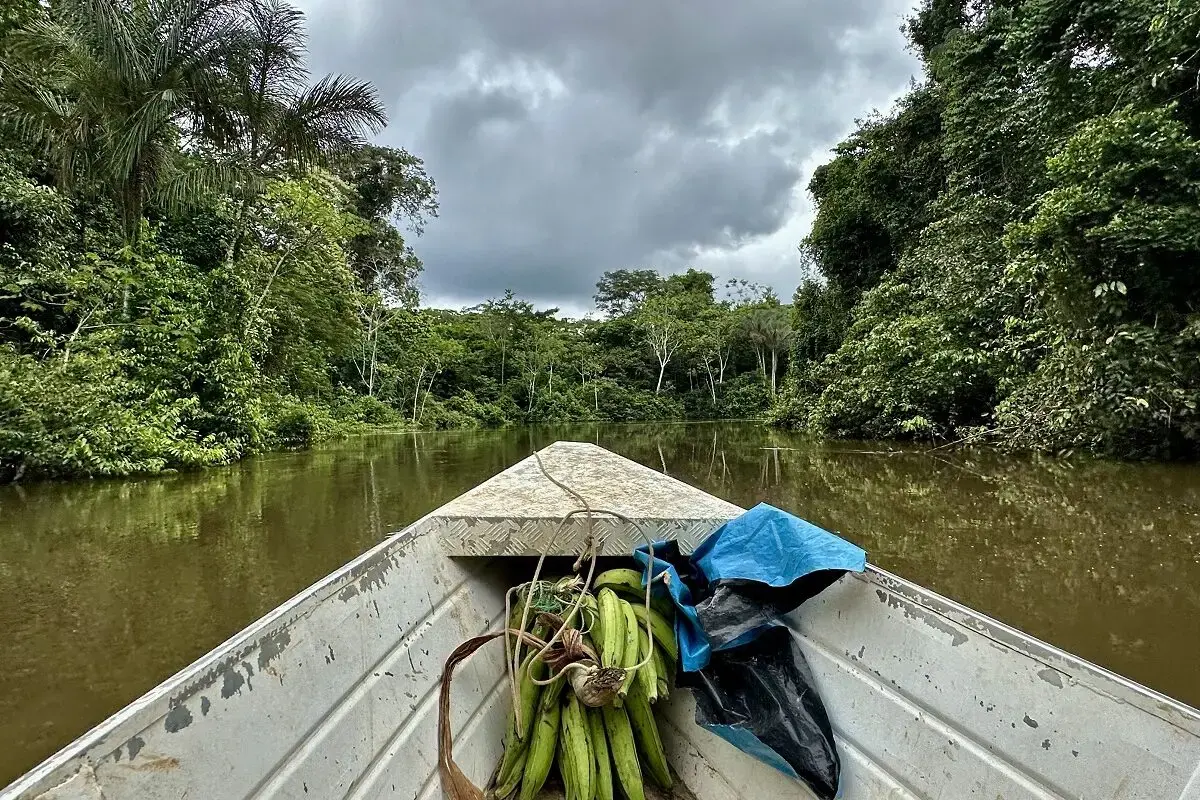
A document obtained by Mongabay suggests the businessmen considered making money not just as middlemen, but also from the design and implementation of development projects in communities. For example, Peru Tecnology Green valued at more than $400,000 the preparation of a “technical file” on greenhouse farming for one of the communities in Peru. Corporate documents accessed by Mongabay showed the company was also looking to place offshore the communities’ share of economic benefits to avoid paying taxes in Peru, and then put part of the money in international investment funds. According to Get Life, these plans have been scrapped.
This investigation also found that the contracts in Peru and other related documents are fraught with inaccuracies. For example, they wrongly, and repeatedly, define carbon credits as liabilities rather than assets, interchangeably use the terms “methodology” and “technology,” and value three native forests at nearly $3 billion without justifying that figure. The contract with the Matsés community in Loreto mixes concepts such as green bonds and carbon credits, while authorizing Get Life to make any necessary arrangements to issue and place those financial instruments in capital markets.
“I do not see legal certainty for communities handing off their economic rights to ecosystem services,” said José Luis Capella Vargas, an environmental lawyer and director of the forests and ecosystem services program at the Peruvian Society for Environmental Law (SPDA). “There is no way I would sign such an all-encompassing agreement, especially one with such blanks, because you don’t really know what you are getting yourself into.”
Community leaders and delegates, including authorities who supported a deal with Get Life, say they never had information about the organizations the company features as allies in the contract, in community assembly minutes, and on the corporate website, which has since been removed.
“No idea who any of them are or where they come from,” an Indigenous Matsés youth who asked to remain anonymous told Mongabay over the phone.
Ronald Soldevilla said he first met the leaders of FICO and Fundación Luciérnaga as honorary president of the Miami-registered Hope Cities Holding, a company prospecting, among others, carbon credit businesses and that, according to UNITAR, has also used the training institute’s logos without authorization.
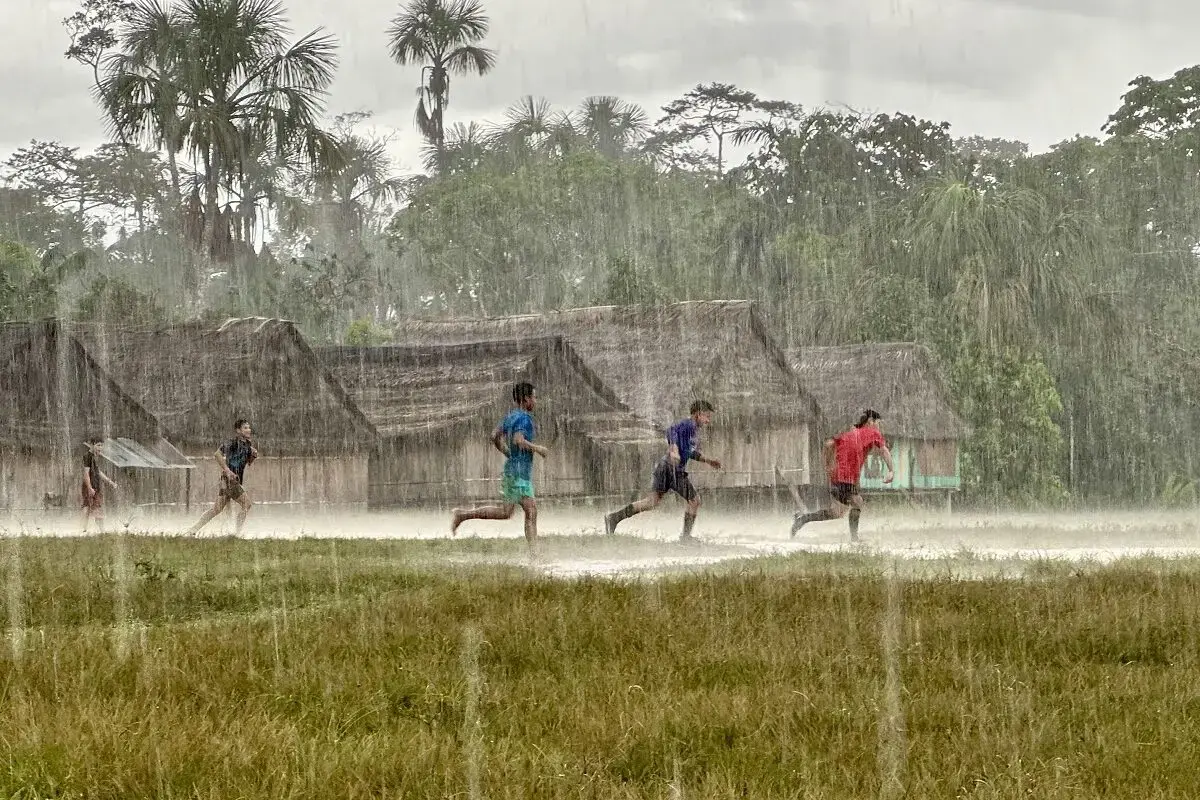
FICO and Fundación Luciérnaga would eventually become Get Life’s allies as it reached three agreements with Indigenous communities in 2022. But Soldevilla said he did not inform CIFAL Argentina, Fundación Luciérnaga and FICO of the key roles attributed to them a fourth contract, signed in January 2023 with the Matsés. He said he planned to tell them if and when the project materialized.
The current vice president of the Sinchi Roca community, Nelson Vitiaco, told Mongabay he had not seen the contract signed between the previous Indigenous leadership and Get Life, or any related document, either: “But we recently fixed some issues with our land title, and stand ready to analyze projects that could benefit our community.”
The leaders of the Fray San Pedro and Matsés communities did not respond to repeated requests from Mongabay for comment. However, the Inter-Ethnic Association for the Development of the Peruvian Rainforest (AIDESEP), the national representative of the Indigenous peoples of the Amazon, expressed concern about this type of deal signed without the knowledge of relevant organizations.
AIDESEP said it was “unaware of the terms of Get Life’s specific agreements with communities in Loreto and Ucayali,” and declared one of the contracts it reviewed as very questionable. “For example, with regard to the cession of rights over ecosystem services, there is quite a lot of similarity with the agreements that … David John Nilsson pretended to sign in 2010 also with the Matsés people,” it said. Nilsson also claimed to have U.N. support. “This company follows the same line of abusive contracts and evidently this is a violation of Indigenous rights,” AIDESEP said.
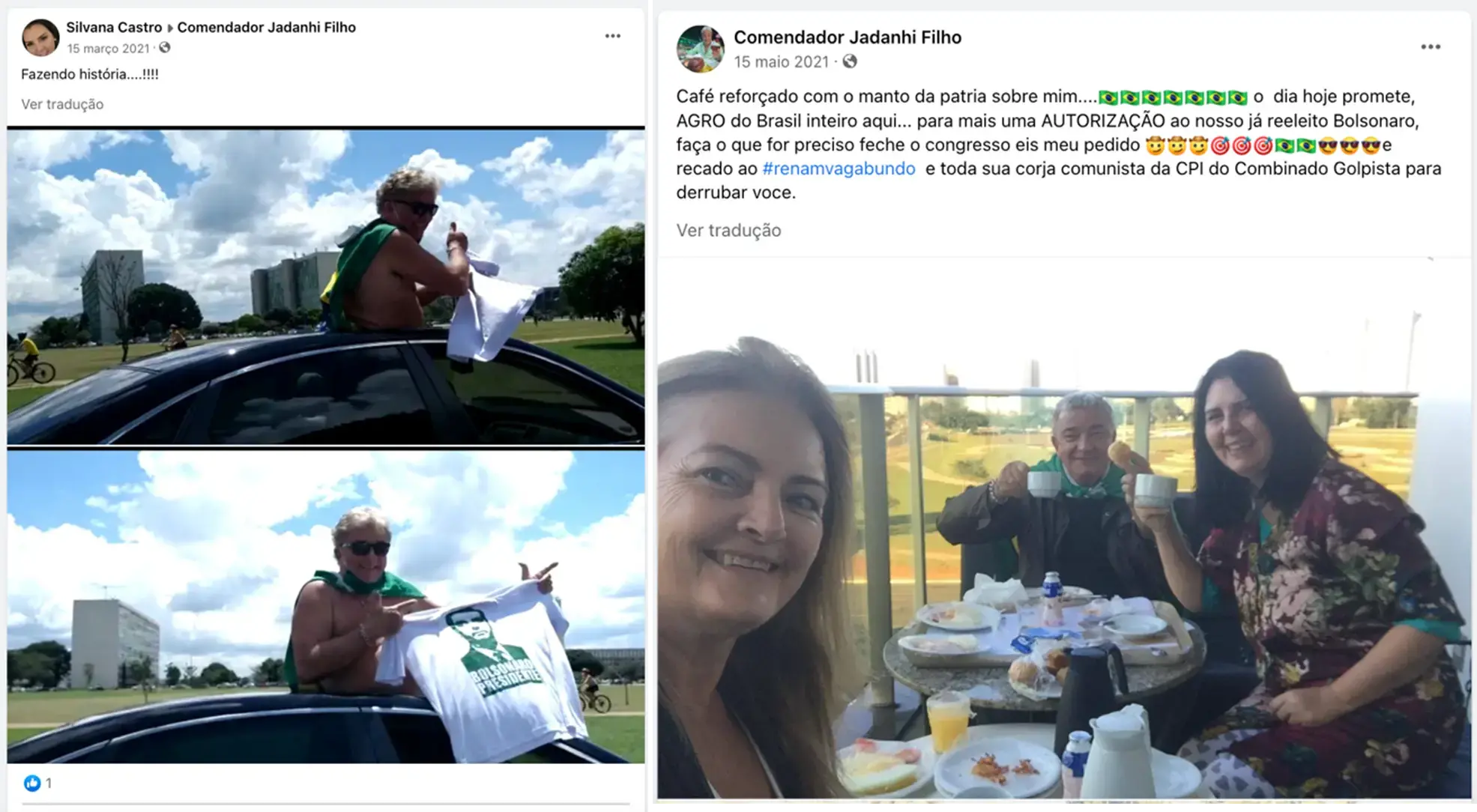
Jorge Pérez, the AIDESEP president, said this second wave of environmental and carbon credit piracy coincides with a big delay from the Ministry of Environment in developing REDD+ regulations. “We are facing numerous initiatives from companies and some NGOs that go into Indigenous territories, often with half-truths, lack of transparency, pressure and divisiveness to promote initiatives and projects related to REDD+ and carbon credits,” he said. Pérez added it is necessary for these agreements to involve regional indigenous organizations and even AIDESEP itself, which has technical staff who can advise on these processes.
Handed a blank check
Contract irregularities also extend to the financial products meant to raise money from investors interested in forest conservation — to date, without any tangible results for people or the forest. Should those financial products make it to capital markets, they could potentially bear risks of financial losses (for communities) and greenwashing (for investors), according to experts consulted by Mongabay.
The idea was that, once communities accepted the deals, FICO would calculate their forests’ monetary value, then package it into SDG bonds that could be traded internationally. SDG bonds are typically issued by governments and international organizations, and sometimes by private companies.
Bond issuers raise money from investors, use that money to finance sustainable development initiatives, and eventually pay back the loan with interest.
But speaking with Mongabay, Get Life said its SDG bonds were not expected to bring investors any financial returns beyond green and sustainability claims.
Mongabay accessed documents from 2022 showing an SDG bond that values the forests of the Sinchi Roca, Puerto Nuevo and Fray Pedro communities at $2.7 billion, a value supposedly representing the carbon stored in the forest and “other natural assets.”
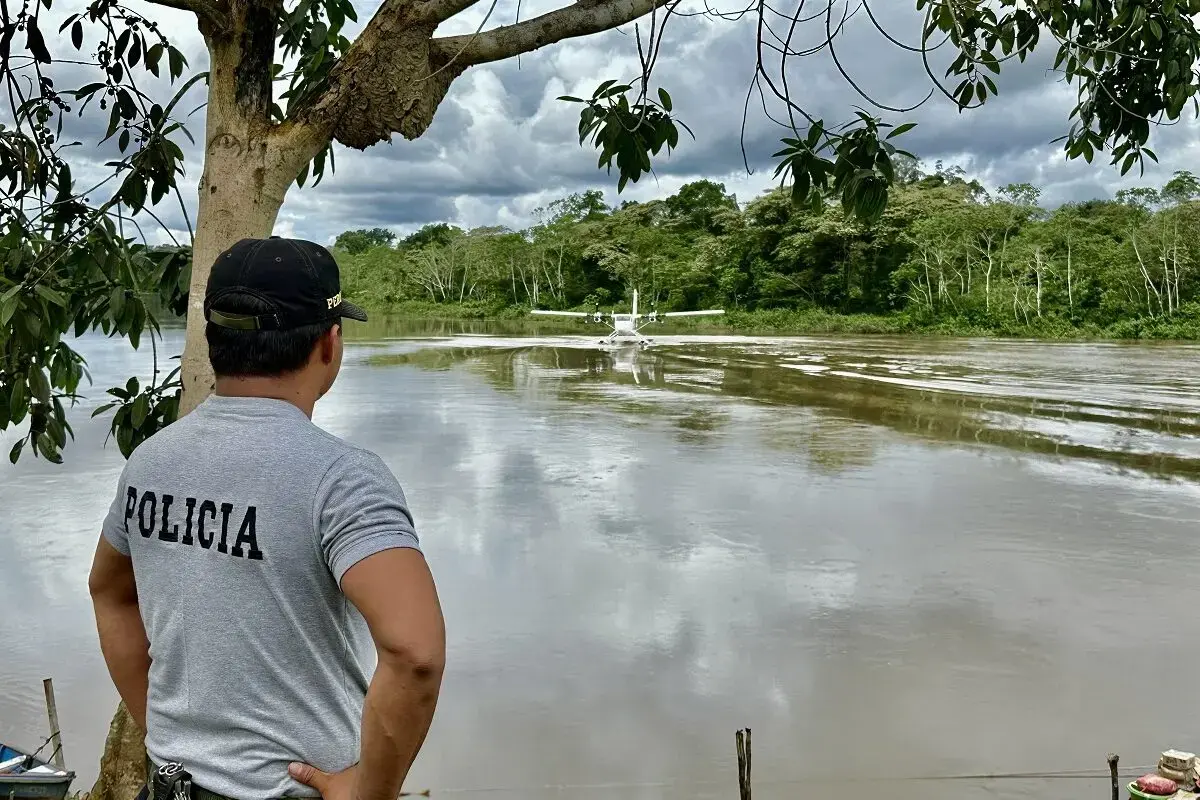
Ronald Soldevilla told Mongabay he was looking to place an updated version of that SDG bond in nonregulated markets. Asked which “other natural assets” underpin the multibillion-dollar valuation, he replied: “Biodiversity in general. I haven’t really checked, I am not a scientist and can’t explain with certainty.”
According to Frédéric Hache, CEO of the think tank Green Finance Observatory, “the specific so-called natural assets should be listed and clearly defined, otherwise it’s a blank cheque and it’s impossible to verify conservation outcomes and the valuation of the security [the ‘SDG bond’].”
Valuing natural assets also requires scientific expertise, not just financial acumen, said Alessandra La Notte, senior environmental economist at the European Commission’s Joint Research Centre on Natural Capital Accounting.
“These types of financial instruments concern ecosystems and the value of their services. That calls for much more than pure financial knowledge to generate meaningful metrics,” she told Mongabay, adding that transparency is essential if figures are to be assessed or trusted.
Ultimately, the SDG bond promising to raise money for Indigenous communities in Peru has been found to hold no value for markets, according to a source who requested anonymity for legal reasons.
For the Matsés community, Get Life turned to its plan B — carbon credits — but that failed too, as the land, mostly overlapping with Matsés National Reserve and with barely any deforestation, didn’t qualify for carbon offsetting.
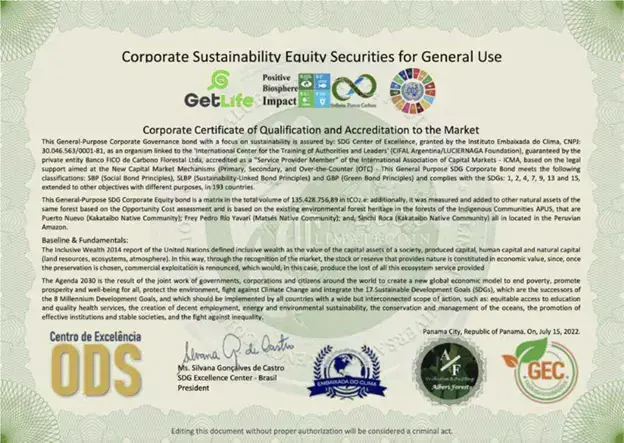
In January 2023, the chief of the reserve, Carola Carpio, attended a closed-door event to witness the signing of the contract between Get Life and the Matsés community.
“During the meeting, we recommended that the document be reviewed over a longer period of time in view of the complexity of the proposed agreement,” she told Mongabay, adding that her attendance was an act of courtesy, rather than a sign of institutional endorsement. Peru’s Directorate of Climate Change, under the Ministry of Environment, did not respond to Mongabay’s interview requests.
Violating Bolivia’s Mother Earth Law
In Bolivia, businessmen specialized in mining, a pillar of the country’s economy, have been teaming up with FICO to make money from forests on Indigenous lands.
The entity dealing directly with Indigenous communities is Bluegrace Energy Bolivia, chaired by a U.S. national and connected to a U.K.-registered private equity firm and holding company. The latter has offices in eight countries, including Spain, Belgium, Argentina and China, and is largely focused on lithium mining and electric cars.
In 2022, Bluegrace signed agreements with several Indigenous organizations: Organización Indígena Chiquitana (OIC) Capitanía del Bajo Isoso, Confederación de Pueblos Indígenas de Bolivia (CIDOB), and Coordinadora de Pueblos Étnicos de Santa Cruz (CPESC). The deals covered parts of La Chiquitania, the largest and best-preserved tropical dry forest in the Americas. In total, they obtained economic rights over 8.3 million hectares of forest, an area the size of Austria.
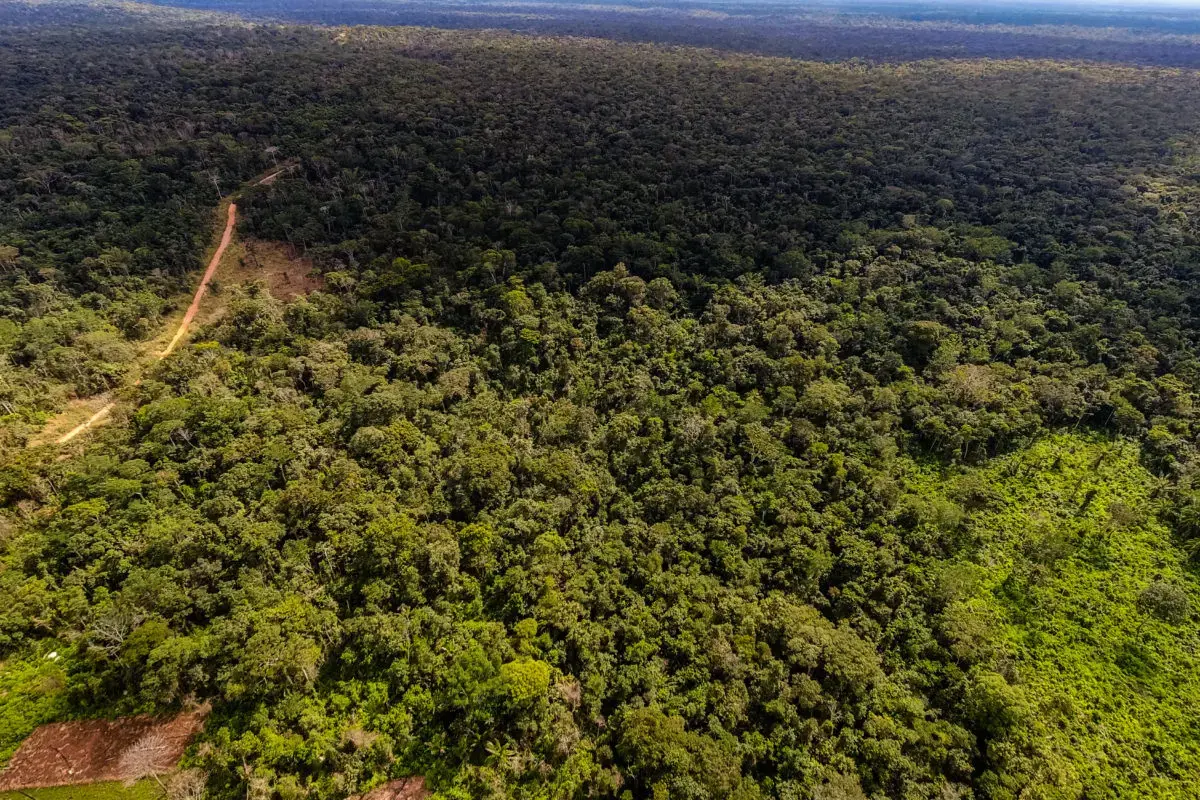
As part of the “Adopt a forest” initiative, the company plans to trade in carbon credits and FICO’s SDG bonds, and use part of the profits for development projects. Despite the scheme’s complexity and financial implications, the agreement with CPESC says that communities must not disclose any economic, financial or technical information, and must get Bluegrace’s permission to discuss the deal.
Without qualified, independent advisers, such confidentiality clauses may increase communities’ vulnerability to abuses, Peruvian environmental lawyer Capella Vargas told Mongabay, speaking in general about these types of arrangements.
According to Bluegrace’s 2023 work plan, the company seeks to make a profit from trading financial instruments underpinned by forests, with half of the cash proceeds going “to Bolivia in general, and local communities in particular.”
Bluegrace Energy Bolivia recently announced its collaboration with FICO and DevvStream, a carbon credit investment company from Canada, on a “Carbon Offsetting via SDG Bond Tokenization & Asset Forestry” scheme.
“But commercializing environmental functions violates Bolivian Framework Law 300,” said Diego Gutiérrez Gronneman, founder and executive director of the Bolivian Society For Environmental Law. “And if an act contrary to the law generates a profit, it is an unlawful gain.”
The regulation, also known as the Madre Tierra (“Mother Earth”) Law, prohibits the trading in natural capital like forests and their ecosystem services. But the country has yet to define specific sanctions as required by Article 35, leaving a legal loophole.
Devvstream CEO Sunny Trinh told Mongabay that Bluegrace had not brought up any potential conflicts with the country’s legal framework. “If we are not generating credits, then there is no purpose in what we do [with them],” he said. Trinh also did not explain the language Bluegrace Energy Bolivia uses in the multiple announcements involving Devvstream.
Justo Molina, president of CIDOB, told Mongabay via phone that Bluegrace “swindled in La Chiquitania” and that his signature, featured on the document, had been doctored. He said he had issued a clarifying statement, but did not send a copy to Mongabay as promised. He also agreed to a phone interview for Dec. 12 but did not respond to calls or messages on that date.
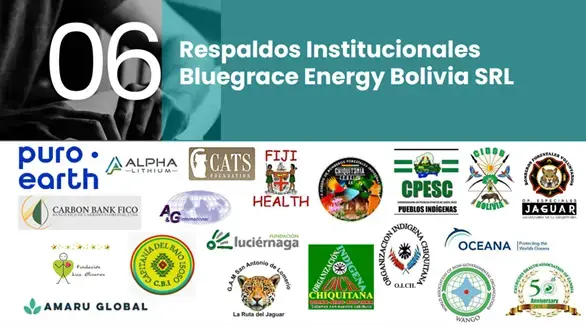
During Mongabay’s visit to CPESC’s office, the leaders present refused to grant interviews and asked for time to inquire about the Bluegrace agreement. They said they were aware that their leaders should not have signed the agreement because CPESC and CIDOB do not have a defined territory, and that any signatures should have come from the leaders of the corresponding Native Community Lands (TCO).
Bolivia’s Plurinational Madre Tierra Authority, which oversees the country’s commitments to climate justice and the non-commodification of nature, did not respond to Mongabay’s requests for interview and information.
Alleged fraud
Despite the scale of Bluegrace’s plans, NGOs working in the dry forests of eastern Bolivia for years said they had never heard about the company. But in the lead-up to the deal with Devvstream and FICO, Bluegrace donated food to communities and said it supported Indigenous fire brigades in the Chiquitano forest.
That came as a surprise to Roberto Vides Almonacid, director of the Foundation for the Conservation of the Chiquitano Forest (FCBC), who told Mongabay that neither he nor other local conservation organizations had ever heard of “Adopt a forest.”
“Bluegrace[’s] … website features photos of Indigenous forest firefighters, but these images were actually taken at our Alta Vista Center in Concepción during a capacity-building effort we conducted earlier this year [2023] with support from authorities,” Vides Almonacid said. “This is a fraud.” The images have since been removed from Bluegrace’s website.
Carlos Alberto Urquiza, elected in April to lead the Chiquitana Indigenous Organization (OICH), said he was unaware of any development in the agreement previous leaders had signed with Bluegrace, and added he had not been informed of their alliance with Devvstream.
Neither Bluegrace director general Nelson Pineda Martínez nor its president, Julio Montenegro, were available for interviews.
Panama connection
Split across two enclaves in Panama’s Darién Forest, the Emberá-Wounaan Comarca is a self-governing Indigenous district spread across more than 438,000 hectares (1.08 million acres) and a buffer for Darién National Park, one of Central America’s largest and most valuable protected areas. The comarca brings together 40 communities, totaling about 10,000 people. Unlike in Bolivia and Peru, FICO engaged directly with the Emberá-Wounaan to gain rights over their forests in early 2022, and even tried to get the government to underwrite its sustainable finance scheme.
“I really couldn’t explain it [FICO’s sustainable finance scheme] very well because I did not actually understand it,” Leonidas Cunampia, the comarca’s chief since April 2022, told Mongabay. “We would put up our titles and then they would deliver the bond or the money, something like that.”
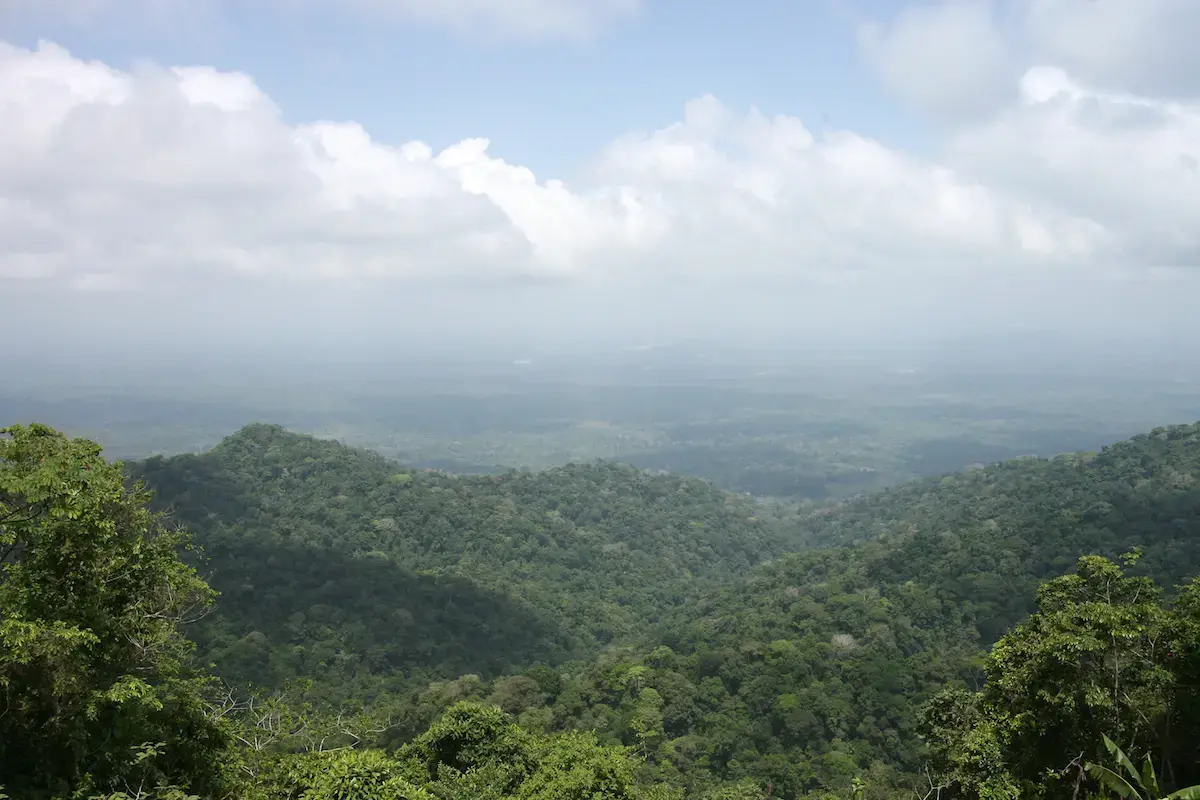
“We saw that it [the comarca] was very compromised and we were not allowed to discuss at all the negotiation regarding our lands,” Cunampia said.
“Communities, which live in hard-to-reach areas, are totally in the dark about that contract [with FICO],” said Yanel Venado Jiménez, a lawyer with the National Coordinating Body of Indigenous Peoples of Panama (COONAPIP), which represents all Indigenous groups in the country. The statutes of the autonomous district require that community members participate in decisions about their territory. But according to Venado, the deals are often negotiated with only two or three people, under the pretext that consulting remote groups is expensive.
Yet national authorities appeared receptive to the plans by FICO and its allies. In April 2022, a local news agency published the companies’ plans to issue millions of securities based on the value of the Emberá-Wounaan’s forests. The Ministry of Economy and Finance (MEF) initially published a statement saying it had not taken any steps to endorse such a move. However, a few weeks later, representatives of FICO, supported by José Kirby, met with ministry representatives to argue their case.
According to a CIFAL Argentina report from May 2023, the authorities allegedly agreed to back FICO’s scheme and create a working group. MEF did not answer any Mongabay queries about the project. However, an official who attended the meeting with FICO confirmed the ministry’s interest.
The Ministry of Environment told Mongabay that green and sustainable finance (e.g. schemes along the lines of FICO’s SDG bonds) was under the MEF’s authority. It also said it was unaware of FICO’s agreement with the Emberá-Wounaan and that it is developing a registry to “map all the carbon projects developed in [Panama’s] national territory.”
Sustainable finance lacks transparency and regulations
“Sustainable finance is the new Wild West,” said Hache from the Green Finance Observatory, adding that regulation has failed to keep up with this fast-expanding industry, leaving space for abuse.







